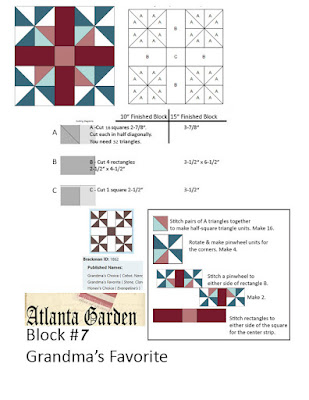Atlanta Garden #7 by Addie
Grandma's Favorite for the Flipper children:
Did Isabella Buckwalter Flipper have favorites?
Photo by George Barnhard, 1864, Library of Congress
Barnhard documented the destruction for Sherman's Corps of Engineers
Ponder and his wife Ellen B. Gregory had moved to Atlanta from Thomasville, down by the Florida line. Ellen, fourteen years his junior, is said to have been beautiful, lively, erratic and wealthy in her own right.
Sketch by Lewis Miller
Their 25-acre estate was known for its fine gardens kept by a talented, enslaved gardener. Over 60 slaves were reported to live on the property before the siege of Atlanta.
Local historian Wilbur Kurtz plotted the house on the Marietta Road
in 1930.
The slaves' ownership was perhaps a contentious financial matter in the marriage and certainly later in the Ponder divorce. By the time the war began the Ponders' marriage was over. Ephraim sued Ellen for divorce in 1861 accusing her of promiscuity, drinking and a habit of aiming a pistol at him.
Atlanta Constitution, June 30, 1930
Decades later Wilbur Kurtz interviewed Sarah Huff a child during the war,
who remembered Ellen Ponder as a widow rather than
a divorcee. (Children needn't know everything.)
The Ponder home still stands at 324 North Dawson in Thomasville.
Ephraim returned to Thomasville and the house he'd built there leaving Ellen in Atlanta to run the estate and manage the bondspeople. Her haphazard supervision was a form of benign neglect that benefitted the Black residents, most of who'd come with the Ponders from Thomasville.
1862
Ellen Ponder seemed to have no trouble mixing in society despite the scandals. Here she used her own name as a Vice President of the charity supporting the Confederate hospitals.
1862
Her personal fortune must have helped maintain her status.
Another of Lewis Miller's Virginia sketches
Among the African-Americans living at the Ponder estate were Festus Flipper and his wife Isabella Buckwalter Flipper (1837-1887).
Festus Flipper
This may be the senior Festus (1837-1887)
or son Festus (1868-1943).
The couple met while bound to different slaveholders. Isabella's was Methodist minister Reuben H. Lucky (Luckey) (1801-1875.) Festus earned enough money to buy his wife and their son Henry born in 1856.
Photos of the Ponder house were taken by George Bernard
during the Union occupation in fall, 1864.
By the time the shelling began in the summer of 1864 Ellen Ponder had left town, taking the Flippers and their small boys with her.
Eldest son Henry, about 8, remembered moving to Macon.
As Sherman's troops marched south from Tennessee the "dissolute mistress's" Atlanta house became an armed camp, filigreed with defense structures, its boxwoods and fruit trees scarred by shells. Ellen never returned to the house, which stood empty and damaged for many years after the war.
Diarist Carrie Berry noted Atlanta's chaos during Union occupation. Black Atlantans who welcomed the Union army bringing hoped-for freedom worried that Hood's Confederate troops might return, kidnap them and send them south. The Berry's enslaved servant Mary left right after Union troops took over.
Grandma's Favorite by Becky Collis
After nine months in Macon the Flippers returned to Atlanta as the war ended. Isabella cooked for the occupying armies and Festus repaired their boots. Their home, a restaurant, also became a school as the Flippers set about educating their boys who, due to Ellen Ponder's neglect, had been illegally taught to read.
After the war Henry and his brothers attended the Storrs School for Freedman
on Houston Street, near their home.
Students and teachers at the Storrs School,
perhaps a Flipper boy or two among them.
Their eldest went on to Atlanta University and West Point's Military Academy.
U.S. Military Academy Collection
Henry Ossian Flipper (1856-1940) as a West Point Cadet.
Isabella's five boys were ambitious and successful.
Grandma's Favorite by Jeanne Arnieri
The Block
Above the cutting
instructions for 10" and 15" blocks.
Henry O. Flipper wrote an autobiography: The Colored Cadet at West Point. Read it online here:
https://www.google.com/books/edition/The_Colored_Cadet_at_West_Point/qmbrAgAAQBAJ?hl=en&gbpv=1
See more of Lewis Miller's paintings of enslaved Virginians.
https://encyclopediavirginia.org/entries/lewis-millers-virginia-slavery-drawings
An 1858 list of 47 slaves held at the Ponder place can be seen at the Thomas County History Center site here:
https://thomascounty.pastperfectonline.com/archive/A76B2F78-124A-4821-9BF3-172248183369
An 1858 list of 47 slaves held at the Ponder place can be seen at the Thomas County History Center site here:
https://thomascounty.pastperfectonline.com/archive/A76B2F78-124A-4821-9BF3-172248183369











.jpg)















2 comments:
Again, thank you, Barbara, for blogging and teaching and researching. It's all so interesting. Wow, searching this home's address found a real estate listing with photos, such a treat to enter this house, touching history. Fireplaces all over, clawfoot tub in the main bedroom, out in the open, simply lovely. BTW, I'm enjoying slowly making HST's from the 8xxx triangles I won in that drawing, it takes time....
Better you than me for those HST's Janet G. Glad you liked the post. I loved learning abut the Flippers.
Post a Comment